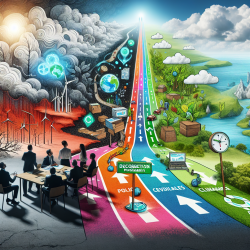The urgency to address the climate crisis requires an unprecedented acceleration in system transformations. This involves shifting development pathways towards achieving net-zero greenhouse gas emissions while also progressing towards other sustainable development objectives. The research article "Examples of Shifting Development Pathways: Lessons on How to Enable Broader, Deeper, and Faster Climate Action" provides valuable insights into how such shifts can be accomplished and what enabling conditions are necessary.
The Importance of Shifting Development Pathways
The Intergovernmental Panel on Climate Change (IPCC) has long advocated for accelerated mitigation efforts. However, greenhouse gas emissions continue to rise, reaching nearly 60 GtCO2e in 2020. The concept of shifting development pathways towards sustainability (SDPS) has emerged as a complementary framework to traditional emission-focused policies. This approach integrates broader societal objectives with climate goals, thereby enhancing the pace and depth of emissions reductions.
Key Enabling Conditions
The research identifies several enabling conditions that facilitate shifts in development pathways:
- Finance: Sustainable financial mechanisms are essential for supporting long-term climate initiatives. Conditional agricultural financing in Brazil and fiscal policies in Sweden serve as examples of effective financial enablers.
- Long-term Vision: A strategic vision guides policy packages and aligns them with sustainable development objectives. Costa Rica's National Decarbonisation Plan exemplifies this approach.
- Governance and Institutional Capacity: Strong governance structures are crucial for implementing effective policies. Sweden's governance model supports both climate action and equality.
Implementing Policy Packages
The research emphasizes the importance of integrated policy packages that address multiple objectives simultaneously. These packages often extend beyond conventional climate policies to include social, economic, and technological dimensions. For instance, Sweden's carbon tax is complemented by social services that maintain equality while reducing emissions.
Lessons for Practitioners
The findings suggest that practitioners can enhance their skills by learning from successful examples of SDPS across different contexts. While some enablers are context-specific, others like finance and long-term vision are widely applicable. Practitioners should focus on creating integrated policy packages that involve a broad range of actors, including governments, private sectors, and civil society.
The research underscores the need for an "all of society, all of economy" approach to climate action. By adopting this comprehensive strategy, practitioners can contribute to faster and deeper mitigation efforts while achieving sustainable development goals.










